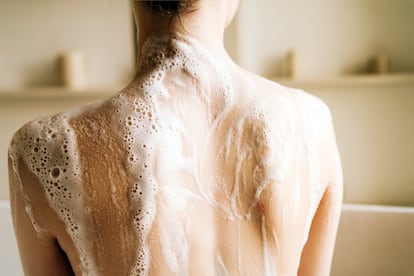The dark side of ‘everything showers’: Classist and bad for the planet
With billions of views on TikTok, the #everythingshower or #showertok trend continues to accumulate more followers every day for its commitment to self-care and hygiene routines that can last over two hours. The trend has grown unstoppably, but that also arouses criticism

Almost seven billion views on TikTok alone corroborate its success. Whether under the hashtag #showertok or the hashtag #everythingshower, the craze for turning the bathroom into an elaborate spa is exploding. These “everything showers,” a concept conceived a couple of years ago, have become one of the most searched terms of the year on the favorite social network of Generation Z. #Showertok is about dedicating between two and four hours of your time to self-care and hygiene: shower, exfoliation, hair removal, use of countless conditioners, shampoos, serums, masks, creams, oils, tanners, all in the same day and with such indulgent attention to each element music, lighting and aromas too. It has not only achieved the status of a shared ritual, but it is also revolutionizing the beauty industry.
“This is a trend based on turning hygiene habits into a kind of ritual aimed at achieving a feeling of well-being, almost as if you were in a spa,” says Dr. Natalia Jiménez, dermatologist at Grupo Pedro Jaén La Moraleja. “In principle, if done correctly and with the right products, it is not harmful. Another question is whether it is essential to carry out this entire ritual to care for or improve our skin.” On TikTok, the enthusiasm is widespread. The debate lies only in the frequency of the experience. Some do it once a week, and others opt to do it monthly. All agree, though, that there are so many steps to these “everything showers” that when they finish they are as exhausted as if they had just left the gym. “It’s a complete exercise routine and when you’re done it’s better to go to sleep,” recalls TikToker Amy Campbell.
Beyond the effects of the COVID-19 pandemic, and the insistence on personal hygiene as protection against the virus, digital gurus have long promised to bring us closer to happiness by giving a small twist to our daily lives, whether when tidying up the living room — hello, Marie Kondo — or preparing the bag that we will take to work the next day. Beauty journalist Laura Capon confirms as much in The Guardian: “There is nothing TikTok loves more than romanticizing the mundane aspects of our lives. We’ve seen it with cleaning, where general chores like hoovering and putting your clothes away have become ‘Reset Routines’. It was inevitable our hygiene routines would also get idealized.” On the other hand, the Wall Street Journal analyzes the boom as an opportunity for the middle classes to have an exclusive experience, but with the advantage that even the most premium shampoo is usually more affordable than any other product in the luxury field. “It is unlikely that we will feel bad about taking a long shower,” they confirm.
@haleyybaylee I cant move #everythingshower
♬ original sound - 💋.
The data confirms the trend’s impact. A study published in 2022 by Cosmetics Europe, the industry’s main continental association, demonstrates that Europeans use an average of seven different cosmetic and personal care products a day and up to 13 a week. Furthermore, up to 62% of consumers consider that these products play a relevant role in the way they are seen by others and directly influence their way of relating. “Making daily hygiene a pleasure is optional and depends on the preferences, availability and priorities of each individual. As specialists, what concerns us most is to convey the message that hygiene and skin care are essential gestures, although it is not necessary to apply routines with so many steps or with so many products,” adds Dr. Jiménez.
Brands have been quick to jump on the wave. Companies like Fenty Beauty and Space NK are already actively recommending which products from their catalog are ideal for a perfect #showertok day. TikTok has become their platform of choice, above Instagram or other more traditional channels. “We’ve seen huge success when it comes to the correlation between TikTok trends in general and an uplift in brand interest and awareness. Whether it’s showertok, hairtok or ‘TikTok made me buy it’, we are consistently seeing the support from TikTok as creators mention us organically in these trending videos,” explains Michelle Miller, vice president of marketing for the cosmetics firm K18, in Vogue Business.
On the other hand, some voices also denounce the potentially toxic aspects of the trend, starting with the environmental impact of such prolonged water consumption in the face of a reality marked by drought. The WHO estimates that a 10-minute shower uses about 200 liters of water and recommends reducing them to four minutes. Such extensive use of products can end up causing skin problems. And there are racist and classist undertones behind another viral concept on the networks these days, that of the “clean girl,” an aesthetic that promotes normative beauty standards through the consumption of cosmetic products. “The ‘clean girl’ aesthetic says to me that we’re still looking for ways as a society to reinforce hierarchies and create forms of exclusion in the beauty space. Where once, the beauty sphere was about inaccessible beauty product hoarding and spending hours learning makeup techniques, now it’s about spending the same money and time on skincare, facial treatments, lash extensions, etc.,” fashion expert Rian Phin told Vice.
Sign up for our weekly newsletter to get more English-language news coverage from EL PAÍS USA Edition
Tu suscripción se está usando en otro dispositivo
¿Quieres añadir otro usuario a tu suscripción?
Si continúas leyendo en este dispositivo, no se podrá leer en el otro.
FlechaTu suscripción se está usando en otro dispositivo y solo puedes acceder a EL PAÍS desde un dispositivo a la vez.
Si quieres compartir tu cuenta, cambia tu suscripción a la modalidad Premium, así podrás añadir otro usuario. Cada uno accederá con su propia cuenta de email, lo que os permitirá personalizar vuestra experiencia en EL PAÍS.
¿Tienes una suscripción de empresa? Accede aquí para contratar más cuentas.
En el caso de no saber quién está usando tu cuenta, te recomendamos cambiar tu contraseña aquí.
Si decides continuar compartiendo tu cuenta, este mensaje se mostrará en tu dispositivo y en el de la otra persona que está usando tu cuenta de forma indefinida, afectando a tu experiencia de lectura. Puedes consultar aquí los términos y condiciones de la suscripción digital.









































